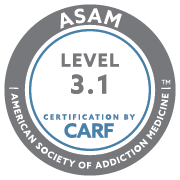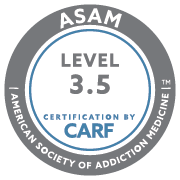
From shopping to baking to decorating, most people gladly welcome a little extra help during the holiday season. For those in recovery from Substance Use Disorder and Co-Occurring Mental Illness, that extra help may look a little different, and may come from those you wouldn’t expect. Our Peer Support Specialists are an integral part of our treatment team. They share lived experience and recovery-based lifestyles, and are trained to assist others in initiating recovery, maintaining recovery, and enhancing the quality of personal and family life in long-term recovery.
Our gift to the community for a healthy and happy holiday season is to share our Peer Support Specialists top tips for navigating the holidays while in recovery. We hope that in these tips, you find the inspiration and the support you need to enjoy the holidays with friends and family this year.
1. Honesty
While in recovery, it’s important to be honest with yourself, as honesty is the foundation to a healthy recovery. Infusing the truth into every aspect of your recovery can help you hold yourself accountable.
2. Hope
When many people begin their recovery journey, they may feel hopeless at the start. At Rimrock, we provide you with the support and the resources you need to feel hopeful about kickstarting your recovery journey.
3. Faith
Having faith in a higher power, whether it’s God, the universe, or some other force, allows us to experience stability in the middle of instability. If you need to find your faith, start by identifying what feels righteous to you.
4. Courage
Taking the first step to recovery is accepting that you are, in fact, ready to recover. Acknowledging that you need help (and that you want help) takes a great deal of courage.
5. Integrity
Define what your own personal values are, and why standing by them during recovery is important to you. In order to have integrity, you must uphold your values, even if others don’t support them or tempt you to abandon them.
6. Willingness
Admitting that you’re ready for help, while also being willing to accept the help that’s offered, can be difficult. Willingness to trust in the process while recognizing there will be barriers along the way that may make you feel discouraged is important for a successful recovery journey.
7. Humility
It’s common to feel a sense of pride and to battle your ego when entering recovery. Humility can help you take a step back and see the situation through a new lens.
8. Self-Discipline
Self-discipline is something everyone struggles with from time to time. Learning to control your emotions and desires is critical, not only during every step of the recovery journey, but during long-term recovery as well.
9. Love
“In the end, all that remains is love.” Love and kindness both go a long way in helping to transform lives. What you give in love ultimately comes back to you and multiplies.
10. Perseverance/Patience
Patience really is a virtue. It takes time to heal your mind and body, and patience can help you repair any tense or damaged relationships with loved ones. It also helps us to appreciate the present moment and to manage our stress.
11. Awareness
Being fully aware of your current situation and accepting the reality of it, rather than wishing your reality were something different, is crucial to a successful recovery. Mindfulness will help you focus on difficult thoughts and feelings, while addiction pushes these feelings aside.
12. Service
When you focus on others, you focus less on yourself. Actively serving another person lets them know that they matter to you and that you are willing to put their needs above your own.
If you need support this holiday season, we are here to help! Our Peer Support Specialists and entire Rimrock team are available if you need support for yourself, or a friend or loved one. Please complete our online request form or call us for help at (406) 248-3175 or (800) 227-3953. Normal admission hours are between 8:00 am and 5:00 pm Mountain Time, Monday through Friday. However, we are available to take your call 24/7.





